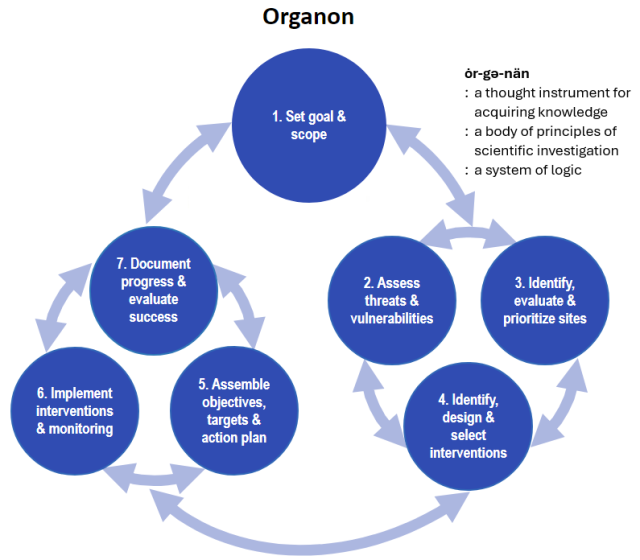About the Organon

The Organon is an adaptive system for climate change planning.
It provides an organizing framework, guiding principles, project examples, and information resources for building resilience and adaptation into environmental and human health activities.
Adaptation refers to adjustment in natural or human systems to a new or changing environment that exploits beneficial opportunities or moderates adverse effects. This is key for maintaining long-term resilience (the ability to tolerate and recover from impacts.
The Organon is not just a theoretical concept, but a practical tool for planning, designing, and implementing adaptive actions for resilient natural resources and human communities.
Click the links below to read more about the underlying concepts and practical uses of the Organon.
What Key Concepts Are Behind the Organon?
How Can I Use the Organon?
Organon Team
Core Development Group
Jordan West, EPA Office of Research and Development (ORD), Integrated Climate Sciences Division
Anna Hamilton, Tetra Tech, Inc.
Jen Stamp, Tetra Tech, Inc.
Ian Reilly, ORISE Fellow at EPA
Candace May, EPA ORD, Integrated Climate Sciences Division
Technical Advisory Group
Britta Bierwagen, EPA ORD, Integrated Climate Sciences Division
Joe Ebersole, EPA ORD, Pacific Ecological Systems Division
Emily Eisenhauer, EPA ORD, Integrated Climate Sciences Division
Caitlin Gould, EPA ORD, Integrated Climate Sciences Division
Susan Jackson, EPA Office of Water, Health and Ecological Criteria Division
Matt Konfirst, EPA Region 3
Rochelle Labiosa, EPA Region 10
Kate Mulvaney, EPA ORD, Atlantic Coastal Environmental Sciences Division
Raven Nee, ORISE Fellow at EPA
Peg Pelletier, EPA ORD, Atlantic Coastal Environmental Sciences Division
Regina Poeske, EPA Region 3
Adam Reilly, EPA Region 1
Hudson Slay, EPA Region 9
Cathy Wigand, EPA ORD, Atlantic Coastal Environmental Sciences Division
